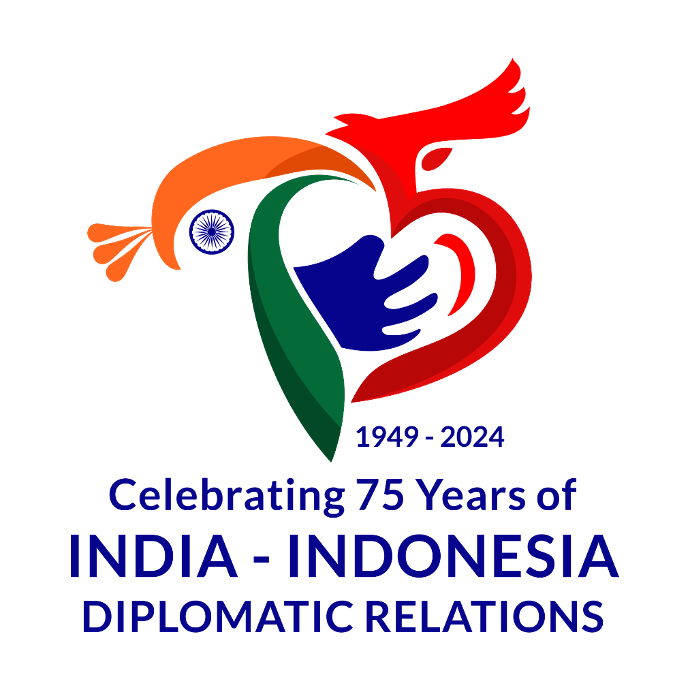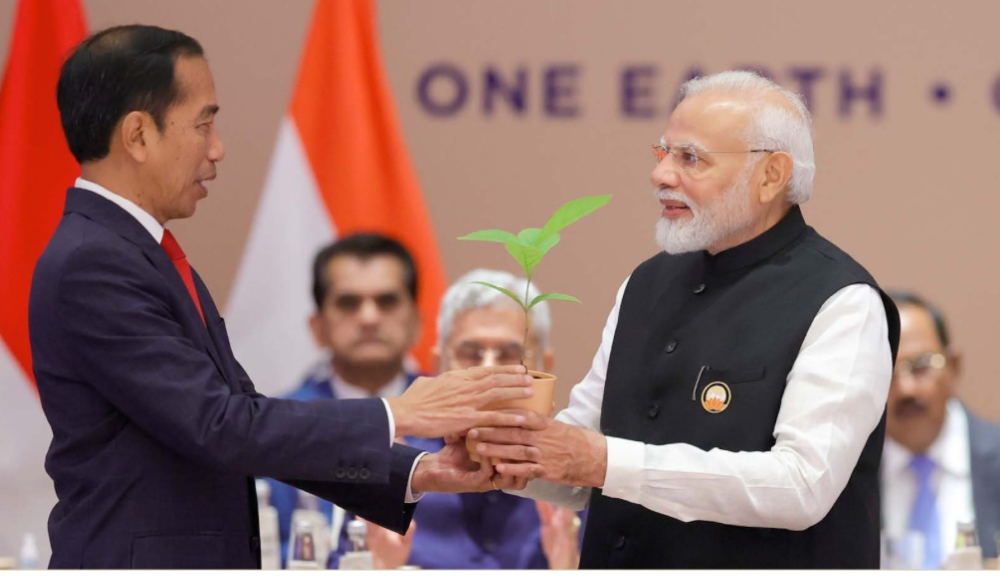By: Sandeep Chakravorty, Ambassador of India to Indonesia
Jakarta, 26 January 2024 – Celebrating India’s 75th Republic Day on 26th January 2024 in a democratic country such as Indonesia is indeed special. As fellow democracies, we connect, understand and appreciate each other in innumerable ways. As both India and Indonesia go to the polls this year, we will witness the celebration of our democracy in its full and untamed glory. For us Indians, Republic Day is an important democratic milestone. It allows the country to take stock of its achievements and reinforce its plans for “Amrit Kaal”, a period of massive national transformation that will lead to “Viksit Bharat” or developed India by 2047. For India, the last 75 years have been a story of accomplishments as the country has not only firmly established its democratic credentials but also delivered to its people the fruits of development.
India today is striding ahead with an impressive growth trajectory and global recognition of what India has achieved. India’s G-20 Presidency during 2023 on the theme of ‘One Earth, One Family, One Future’ based on the time enduring Indian philosophy of ‘Vasudhaiva Kutumbakan’, the whole world is a family, resonated widely in both advanced economies as well as in the Global South. The agenda was inclusive, ambitious, action-oriented and decisive as evident in the issuance of the ‘Delhi Declaration’ which was able to bridge the geo-political divide in an increasingly polarized world. The importance of preserving the Earth for future generations and that of women in society was impressively conveyed through India’s G-20 initiatives of ‘Mission LiFE’, Lifestyle for Environment; and Women Led Development. For the first time ever in 2023, India organized two Voice of Global South Summits. Their aim was to make the needs of the Global South part of the G-20 agenda. President Joko Widodo participated in the second Summit in November 2023 and encouraged the Global South to assume a bigger role in global governance through the reform of multilateral institutions. The inclusion of the African Union as a member of the G-20 at the Delhi Summit was another manifestation of India’s inclusive agenda.
The India Story
The India Story is being driven by the economy which is witnessing increased infusion of technology and digitalisation, greater emphasis on manufacturing in India particularly niche products, building quality infrastructure, ensuring seamless multi-modal connectivity, and increasing competitiveness of India’s export basket. The results are there for all to see. India is presently the 5th largest economy in the world with a GDP of more than 3.7 trillion that is expected to grow at 7% during 2024. There are several predictions that the India will become the third largest economy in the world by 2030 with GDP of more than US$ 7.3 trillion. On several other indicators such as foreign exchange reserves, capital market performance, foreign direct investment, inflation and current account deficit management, India is exhibiting strong performance despite the global slowdown and headwinds witnessed due to the Covid-19 pandemic and the war in Ukraine with consequent disruption in supply chains and increase in costs of fuel, food and fertilizers. Challenges notwithstanding, India’s Current Account Deficit narrowed to 1.9% of GDP in fiscal 2023 while forex reserves touched US$ 617 billion in January 2024. Current inflation stands at 5%, and the fiscal deficit is targeted to be 5.9% of GDP in fiscal year 2024. India’s stock markets have demonstrated an incredible rally touching capitalisation of US$ 4.33 trillion in January 2024, and emerging as the fouth largest equity market in the world, surpassing Hongkong.Even on the basic question of addressing poverty, a recent Niti Aayog report highlights that India has succeeded in making 248.2 million people escape multi-dimensional poverty in the last 9 years. India is well set to achieve SDG Target 1.2 much before 2030. Global CEOs are upbeat on India, as evident in a recent PwC annual global CEO survey, where India has reclaimed the fifth position as preferred investment destination from the ninth position it held last year.
Technology driven people-centric growth has been the hallmark of the India story. The JAM trinity has indeed made its impact felt widely. Jan Dhan or inclusive banking for the poor; Aadhaar or the national unique identity document; and Mobile telephony are a potent combination that has changed the face of both rural and urban India. India has championed the rolling out of Digital Public Infrastructure (DPI), which has empowered both Startups and citizens. It has shown its impact in several areas including increased tax compliance, both personal and value added tax; and provision of citizen services. For example the introduction of FASTag at toll roads has seen toll revenues increase by 9.3 times in 10 years and average waiting time reduce from 734 to 47 seconds. India’s direct benefit transfer programme based on JAM, the largest in the world, has resulted in transfer of US$ 395 billion into the bank accounts of the poor. At the same time, the Startup ecosystem is booming and India today takes pride in having more than 100 unicorns.
Supplementing India’s economic and digital transformation is India’s green transition. India has been the leader in G-20 in meeting its Paris commitment and is poised to usher in a greener and cleaner economy. During 2013 to 2023, installed capacity of renewable energy has increased to 125GW from 28GW with another 50GW under construction. The task before the nation in ‘Amrit Kaal’ is to build on these building blocks to achieve our national goal of ‘Viksit Bharat’, by 2047.
India and Indonesia – 75 years of Partnership and Beyond
In many ways India and Indonesia have similar national ethos of ‘Bhinneka Tunggal Ika’ or ‘Unity in Diversity’. We are also two large nations of the world working on getting prosperity for our peoples within a democratic framework. There is growing convergence between the countries in the political and strategic domain with them sharing a common strategic outlook for the Indo-Pacific. India is a firm believer in strategic autonomy and multipolarity which connects well with Indonesia’s ‘free and active’ foreign policy. Both countries play the role of balancers in the international system and are a voice for peace, diplomacy and development in the world. We share the belief that this is not the era of war.
Our relationship is privileged. We have had the advantage of close cultural and civilizational contact over millennia and a common experience of colonialism. This has brought our people closer together. Post our respective independence we have become natural partners in seeking decolonization and a role for the global south in world affairs. Bonded by the ‘Bandung Spirit’, India and Indonesia have been steady voices of greater role for developing countries in the international order. The relationship has evolved from us being leaders of the Non Alignment Movement and South-South Cooperation to being Comprehensive Strategic Partners dealing with global issues such as climate change and energy transition. In recent times, frequent exchange of high-level visits has provided momentum to our ties. Prime Minister Modi was in Indonesia in 2018, followed by his presence in Bali for the G20 Leaders’ Summit in November 2022, and subsequently in Jakarta for ASEAN-India Summit in September 2023. This was followed soon after by the visit of President Widodo to India for the Delhi G-20 Summit.
Even as the two nations are rapidly transforming, there is striking similarity in goals. India seeks to be ‘Viksit Bharat’ by 2047 whereas Indonesia envisions ‘Indonesia Emas’, golden Indonesia by 2045, the centenary of its independence. India is emphasising ‘Make in India’ and ‘Atmanirbhar Bharat’ or self reliant India to increase the role of manufacturing in its economic pie, while Indonesia is ensuring the success of its ‘Downstreaming’ policy such that there is sufficient processing of raw materials within Indonesia ensuring jobs for the youth. Significant convergence exist between ‘Viksit Bharat’ and ‘Indonesia Emas’ and both countries can achieve their goals substantially by collaboration and cooperation. India’s tremendous strength in digital technology, new and emerging technology, health, pharmaceutical and skilled human resources can contribute greatly towards the realisation of Golden Indonesia and similarly India can be an active participant in Indonesia’s downstreaming policy and Indian enterprises can bolster manufacturing in Indonesia. India’s success in DPI and the use of JAM can be easily innovated for Indonesia.
Both our countries are ‘young’, enjoying demographic dividend as well as democratic dividend. Democracies have to be responsive to the people and here we find a similarity of approach between the largest and the third largest democracies in the world. There is also a commonality in the focus on digitalization, EVs, Startups and green transition. These are the areas where India and Indonesia are natural partners and India is ready to unveil new partnerships. Our bilateral trade relationship has experienced remarkable growth, reaching nearly US$39 billion in the fiscal year 2022–23. In 2023, Indonesia surpassed Singapore to emerge as India’s largest trade partner in the ASEAN region. Our leaders have set a target to achieve U$50 billion in bilateral trade by 2025 which is the guiding mantra for our economic relationship. The commencement of direct flight connectivity in 2023 between major Indian and Indonesian cities has facilitated closer cultural, tourism, and business links. The presence of a successful Indian diaspora community is being leveraged to expand mutually beneficial businesses with meaningful and transformative socio-economic impacts, such as emerging collaborations between hospitals for delivering quality healthcare, financial inclusion through fintech partnerships and meeting energy transition goals through start-ups collaborations, to name a few immediate possibilities.
India and Indonesia are maritime neighbours and have always been sea faring nations. The distance between Andaman & Nicobar Islands and Aceh is barely 80 nautical miles. The waters of the Indian Ocean have over millennia bathed our shores, nourished our cultures and allowed for close and enduring interactions. For us, the sea has been a bridge, a medium, not a barrier. Prime Minister Modi, during his visit to Bali in 2022, aptly described the bilateral journey when he said, “The huge waves of the sea have kept the relations between India and Indonesia full of enthusiasm and untiring. Our relations remained afloat like those waves.” India’s ‘Act East Policy’ and ‘Indo-Pacific Oceans Initiative’ reaffirm the centrality of the ASEAN Outlook on the Indo-Pacific to ensure peace and development in the region, and Indonesia is India’s strongest partner in this region. The ‘Shared Vision on Maritime Cooperation in the Indo-Pacific between India and Indonesia’’ agreed by PM Modi and President Jokowi in 2018, lays the roadmap of our cooperation. We are working together to boost regional infrastructure development and several new ideas including direct flights and new direct container services, local currency settlements, Andaman-Aceh Connectivity Initiative, Indian investment in the Kualanamu airport, Medan are examples of renewed momentum in our bilateral ties.
2024 is a landmark year in the friendly ties between our two countries as we are commemorating 75 years of establishment of diplomatic relations. Throughout the year, the Embassy of India, Jakarta along with the Consulates General in Medan and Bali will organize several events and activities to highlight the robust bilateral relations. Being close partners in the region and at the international stage, India and Indonesia can turn into global powerhouses, capitalizing on their vast domestic markets, a youthful and technologically adept labour force, and an expanding middle class. The year 2024 has given us yet another opportunity to reaffirm our commitment to contribute to our partnership goals. Being two forward-looking democratic nations, fueled by the national ambitions and strong economy powered by youthful demography, both India and Indonesia stand to gain by strengthening and supporting each other’s capabilities to realise a mutually rewarding partnership. We take enormous pride in celebrating our 75th Republic Day and the 75th anniversary of our diplomatic relations with another democratic partner, Indonesia. Jai Hind! Dirgahayu Indonesia!


